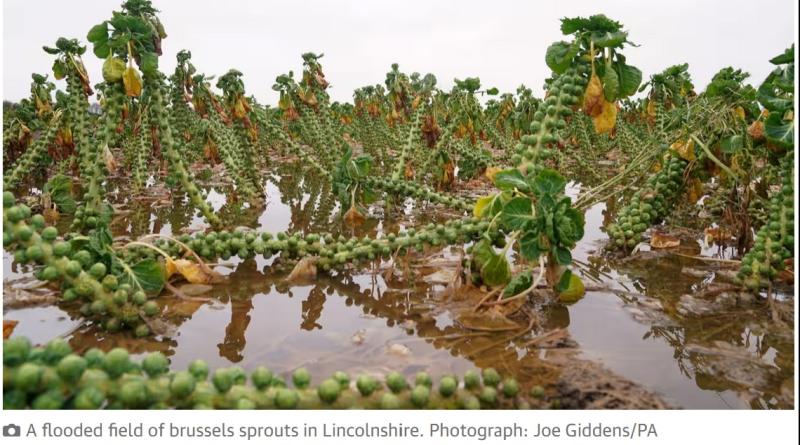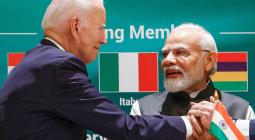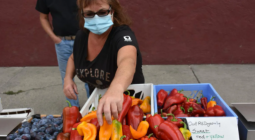UK facing food shortages and price rises after extreme weather

The UK faces food shortages and price rises as extreme weather linked to climate breakdown causes low yields on farms locally and abroad.
Record rainfall has meant farmers in many parts of the UK have been unable to plant crops such as potatoes, wheat and vegetables during the key spring season. Crops that have been planted are of poor quality, with some rotting in the ground.
The persistent wet weather has also meant a high mortality rate for lambs on the UK’s hills, while some dairy cows have been unable to be turned out on to grass, meaning they will produce less milk.
Agricultural groups have said the UK will be more reliant on imports, but similarly wet conditions in European countries such as France and Germany, as well as drought in Morocco, could mean there is less food to import. Economists have warned this could cause food inflation to rise, meaning higher prices at supermarkets.
Tom Bradshaw, the president of the National Farmers’ Union, said markets had “collapsed” as farmers fail to produce food in the punishing conditions. He said: “We’re going to be importing a lot more product this year.”
One major retailer said the wholesale price of potatoes was up 60% year on year as much of the crop had rotted in the ground.
Supplies of potatoes have also been affected by a 10% reduction in the area planted last year as farmers switched to less weather dependent and more financially secure crops. Industry insiders said they expected a further 5% fall in planting this year.
Jack Ward, chief executive of the British Growers Association, said: “There is a concern that we won’t ever have the volumes [of potatoes] we had in the past in the future.”
He said wholesale prices were too low for farmers to generate enough income to cope with high fuel, labour and machinery costs as well as the effects of climate breakdown. “We are not in a good position and it is 100% not sustainable.”
Supplies of carrots and parsnips, which are left in the ground and so also affected by sodden soils, are also much lower than usual, pushing up prices.
Martin Lines, the chief executive of Nature Friendly Farming Network, said: “The impact in the UK this year will significantly affect potatoes and the salad crop. Farmers are already facing delays in planting, with many fields in poor condition. If planting occurs at all, it will likely be late, potentially leading to a shortage of root vegetables and potatoes this coming winter.
“Some farmers have ceased planning for planting altogether, opting instead to put fields into fallow or switch to alternative crops. This could also result in shortages of wheat, barley and pulses as it’s currently unprofitable to grow these due to the lateness of the season and low forecasted prices.”
Guy Singh-Watson, the founder of the organic vegetable box company Riverford, said he had so far planted “virtually no veg”. “Some overgrown plants cannot wait any longer to go in the ground, and will have to be ditched.”
While retailers often turn to imports to fill gaps on shelves, farmers across Europe are enduring a similarly difficult start to the year, with difficulties developing winter crops and sowing spring crops.
France is experiencing the poorest start to its wheat-growing season since 2020 amid cold wet weather, while production of fruit and vegetables in Morocco is being affected by drought. Morocco’s second-largest reservoir has dried up, meaning irrigating crops will be difficult.
Amber Sawyer, an analyst at the Energy and Climate Intelligence Unit, said last year almost a third of the UK’s tomatoes, and more than two-thirds of its raspberries and brussels sprouts, came from Morocco.
“As climate change worsens, the threat to our food supply chains – both at home and overseas – will grow,” Sawyer said.
Scientists have said this is just the beginning of shocks to the food supply chain caused by climate breakdown and that without rapid action to drive down emissions by ceasing to burn fossil fuels, the current system is unsustainable.
Dr Paul Behrens, an associate professor of environmental change at Leiden University in the Netherlands, said: “We should all be extremely concerned. We need to be doing everything to reduce emissions while transforming our food systems.”
He added: “If we don’t … I expect huge turmoil and escalating prices in the next 10 to 20 years. When food prices spiral we always expect political instability. I wish people understood the urgent climate threat to our near-term food security.
“Fortunately, we know many ways we can make the food system more resilient while reducing food emissions. The biggest opportunity in high-income nations is a reduction in meat consumption and exploration of more plants in our diets.”




